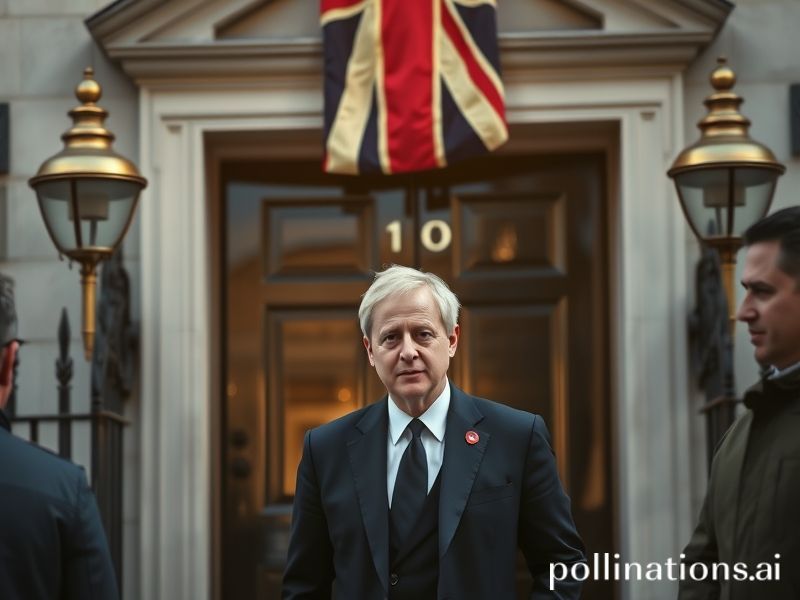Global Spectator Sport: Watching the UK Government’s High-Stakes Sitcom from Afar
The View from Abroad: Watching the UK Government as if it were a Long-Running Sitcom with Nuclear Submarines
By Our Man in Geneva, nursing his third espresso and a mild case of Brexit whiplash
From the banks of the Rhine to the karaoke bars of Seoul, foreign ministries keep a special filing cabinet marked “UK—Handle with Irony.” Inside you’ll find briefing notes that read like Netflix blurbs: “Season 14, Episode 7: Prime Minister swaps lettuce for cabbage, audience still confused.” The British government, once marketed as the Rolls-Royce of administrative competence, now feels more like a Trabant with a spoiler: endearing, noisy, and emitting visible distress signals that other nations study for dark comic relief.
Start with the revolving door at Number 10. Since 2016, the UK has burned through leaders faster than a Mediterranean summer burns tourists. Each outgoing premier pens a heartfelt “we are a great nation” letter, then hurls themselves into the after-dinner circuit faster than you can say “Singapore-on-Thames.” Foreign diplomats keep a sweepstake on whether the next resignation speech will be delivered in Latin, Morse code, or interpretive dance. In Beijing, bureaucrats reportedly watch PMQs with the same anthropological fascination they once reserved for footage of pandas attempting origami.
The economic subplot is equally binge-worthy. Having weaponised nostalgia for an empire that ran on tea and gunboats, the current government now tries to fund today’s health service with slogans about “Global Britain.” Bond traders respond by pushing gilt yields higher than a freshman philosophy major. Meanwhile, France quietly requisitions every spare customs officer it can find, like a neighbor who borrows your lawnmower after you’ve bragged you’ll never need to mow again.
Climate policy offers another episode of exquisite self-sabotage. The Kingdom that once blackened the skies of Manchester now vows to lead the green revolution—except when it auctions new North Sea drilling licences the way other countries raffle off meat trays at rugby matches. Delegates at COP conferences exchange glances that say: “Yes, we too have that uncle who swears he’s quitting smoking while buying a carton at duty-free.”
Defence remains the UK’s prestige product, a Trident-shaped pacifier waved at the world to prove the country still matters. Every so often a minister pops up to pledge aircraft carriers to the Indo-Pacific, prompting polite coughing from admirals who remember the last time the fleet ran out of fuel near Portsmouth. Across the Potomac, Pentagon planners update their spreadsheets: “Royal Navy—Status: Engaged in photo opportunities.”
Yet the greatest international impact may be psychological. In an era when strongman populism is trending like low-rise jeans, Britain has pioneered a softer brand: performative chaos. Instead of jailing opponents, it simply schedules elections in the middle of leadership crises, creating the democratic equivalent of speed dating. Autocrats from Caracas to Minsk watch and wonder if the trick is not to suppress the vote, but to exhaust it.
For the EU, Brexit has become the gift that keeps on giving—like a fruitcake that periodically reappears at every diplomatic reception. Each new UK proposal is unwrapped with ceremonial dread: “Ah, the Northern Ireland Protocol again, still moist.” Brussels diplomats feign sympathy while quietly updating their LinkedIn profiles to highlight “experience in contingency planning.”
And so the world leans in, popcorn in hand. The UK government—once the stiff-upper-lip protagonist of global stability—has morphed into tragicomedy: a country negotiating trade deals with itself, scheduling growth while shrinking, and exporting self-deprecation as its last reliable commodity. The final irony is that the performance itself retains value. Foreign investors still park cash in London property, not because the boiler works, but because the show is too big to cancel. After all, even a burning West End marquee draws a crowd.







